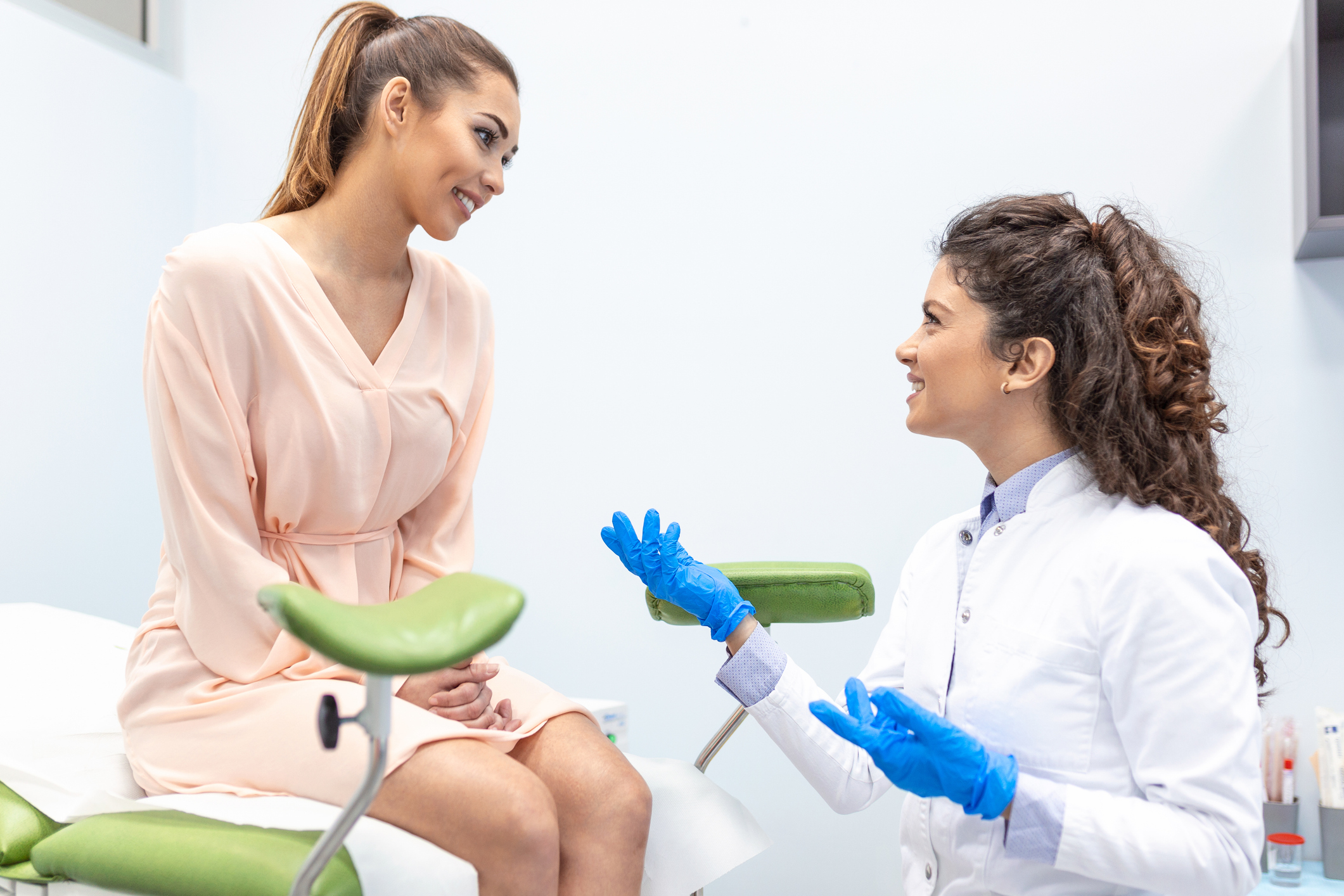Cervical screening is for 25+ but here's the important reason why your teen needs to know all about it before then, according to a doctor
Your teen won't have the procedure until the age of 25+


Although cervical screening doesn't begin until the age of 25, falling uptake and misinformation around the procedure make early education crucial - a sexual health specialist shares why you should be discussing this with your teen.
The teenage years are a good time to talk to your daughter about taking charge of their own health and monitoring their bodies for changes as they get older. This will include what to expect during puberty, when their periods begin and when they'll need intimate screening for procedures - including mammograms and cervical screening.
We spoke in depth to Dr Deborah Lee from Dr Fox Online Pharmacy about the importance of preparing your teenage daughter for these tests, from a young age. She told us "Young people often take the lead from those caring for them. In the past, women tended to learn about periods, sex, contraception and smears from their mothers and grandmothers. However, these days, young people often turn to social media and the internet for health information, much of which is inaccurate, and can put them off from accessing the right healthcare. In a recent study, almost half of TikTok health videos contained misleading information. Therefore, early discussion at home is vitally important."
In this article, Dr Deborah Lee discusses how to talk to a teen about what to expect from cervical screening, why they're so important, and some key facts you can share with them. This will reduce any anxiety they might have about this procedure, which is ultimately life saving.
What is cervical screening?
Dr Lee shares that cervical screening was first introduced in the UK in 1964, but the call and recall system was only properly organised in the 1980s. The cervical screening programme saves on average around 4,500 lives every year by preventing the onset of cervical cancer - prevention is always better than cure. However, according to Jo's Cervical Cancer Trust, attendance rates are dropping, which emphasises the importance of ensuring your daughter will one
If your teen asks, Dr Lee suggests walking them through the basic biology of the procedure. She tells us to say that cervical screening, otherwise known as a smear test, is "A small sample of cells taken from the cervix (the neck of the womb). The smear is examined under the microscope looking for any abnormal cells which if left untreated, could go on to develop into cervical cancer. A smear is screening test. It is taken to prevent a woman from ever developing cervical cancer. It is a small scraping of cells from the cervix which are them examined under a microscope."
How to prepare your teen for cervical screening
Dr Lee shares the following tips:
GoodtoKnow Newsletter
Parenting advice, hot topics, best buys and family finance tips delivered straight to your inbox.
- Make time to chat to your daughter about the female body and the things that will happen to her through puberty and beyond. Try and make taking about these things fairly normal and routine. There’s no sense in making it a taboo subject. Having a smear is part of growing up and normal womanhood. It’s a responsible thing to do and is part of looking after her own sexual health.
- There are a lot of old wives’ tales about smears. Get properly informed yourself by reading websites about cervical screening so you have the correct facts. You can look at this together.
- It’s important to always answer children ands young people’s questions honestly but not bombard them with information if they are not ready. Be a good listener, and tell your daughter as much as you think she wants to hear. She will absorb that, and next time ask a little more. You don’t need to say it all at once.
- Watch the procedure. When the time is right, why not suggest she watches a video of a woman having a cervical smear. Knowledge is power.
- You can tell her about your own experiences of having a smear. Hopefully these were positive! If you’ve had a negative experience don’t relay the story in graphic detail, that's what happened to you but there’s no certainty it would happen to her. Tell her when you are going to have your smear.
How to speak to your teen about what to expect from a cervical screening appointment
Dr Lee shares insight about this subject in depth, telling us "Make sure your teen knows a smear is not a test for cervical cancer. It is a test for precancer which can be easily treated and cured - to prevent cervical cancer from ever developing.
Tell your daughter she will get a letter in the post around the time of her 25th birthday inviting her to make appointment at her GP practice or at the Sexual Health clinic to have a smear. After her 25th birthday, she can expect a smear every 3 years until age 49, then 5 yearly to age 64."
This is what to expect at the appointment:
- When you get to the clinic, the staff will do their best to put you at ease.
- Remember all the female staff in the clinic will be having smears too, so they know exactly what its like.
- You should try not to feel embarrassed, frightened or anxious. They do smears regularly, many times every day. Its just a routine part of their work. They are trained to treat you with kindness, dignity and respect.
- First, the doctor or nurse will take you into the consultation room and ask a lot of questions. These are things like the date of the first day of your last period, if there is any chance you could be pregnant, if you have had any unusual bleeding such as bleeding between periods or after sex, and if you are using hormonal contraception.
- They will also check all your personal details – name, date of birth, home address and contact details which is vital, so your smear doesn’t get lost and the know where to send your results. You can also ask any questions.
- If you are concerned about having the smear, feel free to ask anything that’s worrying you.
- You should be offered a chaperone. This is someone who works in the clinic who will be there to support you and act as a casual observer.
- Sometimes you may be asked if you mind a medical student or student nurse in the room when you have your smear. This is up to you, if you don’t want them there, you are quite within your rights to say no. This is absolutely fine.
- Next you will be shown into the examination room. You will be asked to remove your clothes from the waist downwards and sit on the end of the exam couch. A modesty sheet will be placed over your lower body to keep this covered.
- The doctor or nurse will wash their hands and put on a gown and gloves. This is standard procedure.

- You will then be asked to lie down on your back and slide down the couch, so you feel your bottom is slightly hanging off the edge. The staff will help position you.
- The nurse or doctor will raise the bed and position a bright light so they can see into the vagina and get a good look at the cervix – the neck of the womb. They need to pass a speculum which is a metal or plastic device that looks like a duck’s beak.
- They then gently pass this into the vagina and open the speculum so that is holds the vaginal walls out of the way and allows them to see the cervix. They will fix the speculum so it stays open for just a short time so they have two free hands.
- Manipulating the cervix can cause a little discomfort as they do need a good view of the cervix to take the smear. It’s important to trust the doctor or nurse, takes some deep breaths and try hard to relax - try and think of some positive thoughts.
- It won’t last very long. The complete smear appointment should last less than 10 minutes.
- Taking the smear means inserting a plastic wand and applying the brushes to the cervix itself. The wand is rotated five or six times, fairly quickly, with reasonable pressure, before it is removed, and the cells are rinsed off in a vial of fixative. This is called liquid base cytology (LBC). You can feel it being done but it shouldn’t be painful, just a little uncomfortable.
- Women do sometimes bleed after a smear. This is normal and you should not worry about it.
- There is no need to have an internal vaginal examination when you have a smear, unless this is needed for some other reason than smear taking, which will have been agreed beforehand.
- The speculum is then carefully removed. You are asked to sit up, get dressed and you can go home.
- You should be told roughly how long it will take to get your results. If you don’t get your results in that time frame, you should contact the clinic and ask for them.
Key cervical screening facts for your teen
- Some women don't attend. Dr Lee shares "Very sadly around one third of women who are invited for a smear test fail to make an appointment and don’t attend for their smear. This is around 4.6 million women per year. This is tragic because cervical cancer is preventable by having regular smear tests. If you are reading this and know you are not up to date with your smears for any reason, please make an appointment as soon as possible."
- Celebrities campaign for screening. Dr Lee adds "At present celebrities such as Cara Delevingne and Chloe Sims have supported the ‘Help us help you’ smear campaign. Show your daughter that celebrities she probably admires are supporting the smear campaign."
- You might have symptoms between screenings. "If you have any strange symptoms, especially abnormal bleeding, don’t wait for your next smear test which could be years away, go and see your GP or the Sexual Health Clinic without delay," Dr Lee tells us. She adds "Symptoms that mean you should make an appointment include any unscheduled bleeding, abnormal vaginal discharge, painful sex or pelvic pain, frequent urination, bloating, or feeling a lump in the abdomen - or down below."
- Special clinics are available. Dr Lee tells us "There are also specialist smear clinics for women with a difficult cervix and if this is ever needed, you can be referred to one of these. Don’t suffer at home, too scared to go for an appointment. Please, go and discuss your worries with your GP, practice nurse or Sexual Health Clinic. They will do everything they can to help you."
- 99% of cervical cancer is caused by the human papillomavirus (HPV). Almost 90% of parents give permission for their children to have the HPV vaccination aged 12 or 13 years. The current vaccine Gardasil 9 gives protection against nine different subtypes of HPV. The key point is that teenagers are vaccinated before they become sexually active so they cannot become infected with the HPV virus. HPV causes visible genital warts, premalignant changes at the vulva (VIN) vagina (VAIN), cervix (CIN) and anus (AIN), as well as vulval, vaginal, cervical and anal cancers," Dr Lee says.
- The NHS plans to eradicate cervical cancer by 2040. The cervical screening and HPV vaccination programs are so successful, the NHS has recently stated its aim is to eradicate cervical cancer by 2040.
For more on teens, if your teen will not socialise, or won't revise, our experts share what to do. If your teen is struggling with big emotions, reflective parenting can help.

Having worked for many years in the NHS, mostly as Lead Clinician within an integrated Community Sexual Health Service, Dr Deborah Lee now works as a health and medical writer, with an emphasis on women's health, including medical content for Dr Fox Pharmacy. She has published several books and remains passionate about all aspects of medicine and sexual health.

Lucy is a mum-of-two, multi-award nominated writer and blogger with six years’ of experience writing about parenting, family life, and TV. Lucy has contributed content to PopSugar and moms.com. In the last three years, she has transformed her passion for streaming countless hours of television into specialising in entertainment writing. There is now nothing she loves more than watching the best shows on television and sharing why you - and your kids - should watch them.